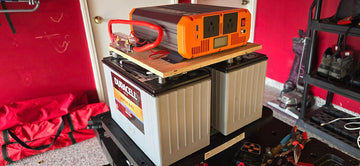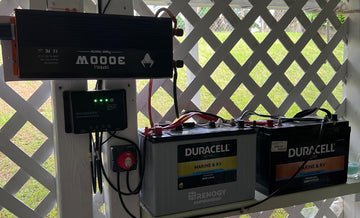The 18650 rechargeable battery is one of the most common batteries on the market, usually a lithium-ion battery. It is becoming an important part of our portable devices. In this article, we will discuss everything you need to know about 18650 batteries.
Content:
- What are 18650 rechargeable batteries?
- Rros and cons of 18650 rechargeable batteries
- How do I recharge my 18650 lithium-ion battery?
- Why are 18650 batteries so expensive?
- 18650 li-ion battery application
- 18650 lithium battery safety precautions
- What are the signs that an 18650 battery needs to be replaced?
- FAQ
What are 18650 rechargeable batteries?
The 18650 battery is a lithium-ion battery, and the number "18" indicates the diameter of the battery is 18 millimeters, "65" indicates the height of the battery is 65 millimeters, and "0" represents a cylindrical battery. The number "18" indicates that the diameter of the battery is 18 mm, "65" indicates that the height of the battery is 65 mm, and "0" indicates a cylindrical battery. This type of battery has a high energy density, the capacity can be up to four times that of an AA battery , often between 2000mAh and 3500mAh.
Known for their versatility, 18650 rechargeable batteries are a universal power solution for a wide range of portable electronic devices due to their rechargeable nature and robust performance.

Chemical composition
The positive electrode of 18650 batteries is synthesized from compounds of lithium ions, such as lithium cobaltate (LiCoO2), lithium manganate (LiMn2O4), and lithium iron phosphate (LiFePO4). The negative electrode is usually made of graphite.
Specifications
18650 rechargeable batteries have a voltage range of 3.2 to 3.7 volts and a capacity of 2500mAh to 3500mAh. These specifications make them considered as high drain batteries. They are designed to produce enough current and voltage to meet the requirements of the products they power.
- Standard charge voltage: 4.2 volts
- Recommended charge cutoff voltage: 4.2 to 4.3 volts
- Discharge cutoff voltage: Typically between 2.5 and 3.0 volts
Performance
18650 Li-ion batteries are known for their high performance. They are lighter than other types of batteries and can deliver a more consistent current. A large charge can be stored relative to their size, while they are less likely to be damaged by low discharge. 18650 lithium-ion rechargeable batteries are the most popular due to their cost-effectiveness.
Application
18650 batteries last longer and charge faster than other battery types. These specifications make them an excellent choice for powering a variety of products, from everyday devices to cutting-edge equipment. Examples include flashlights, power tools and solar storage . Some 18650 lithium-ion batteries are used to make battery packs for electric vehicles. Multiple cells are packaged together to create a powerful, lightweight battery.
Rros and cons of 18650 rechargeable batteries
Pros
- High stability: 18650 batteries maintain a relatively stable voltage throughout the discharge cycle, ensuring stable power to the device even under changing loads. Designed to prevent overcharging, over-discharging and short-circuiting.
- Low internal resistance: These batteries have low internal resistance, which enables efficient energy transfer and reduces heat generation, making them suitable for devices with high power consumption.
- High energy density: With a high energy-to-weight ratio compared to other batteries, 18650 batteries offer a large energy storage capacity, making them ideal for compact devices that require long-lasting power.
- Excellent charging performance: Fast charging and discharging characteristics, high charging efficiency and fast charging rate.
- Rechargeability and low memory effect: With minimal memory effect, these batteries can be recharged frequently without full discharge, maintaining performance and capacity.
- Durability and longevity: 18650 Li-ion batteries are designed for hundreds of charge cycles, providing longer life and greater reliability for long-term use.
- Wide range of applications: 18650 Li-ion batteries are suitable for a variety of devices such as handheld devices, power tools, electric vehicles, lighting equipment, etc.
Cons
- Safety Issues and Thermal Runaway: 18650 lithium-ion batteries can pose a safety hazard if used improperly or if externally damaged. For example, overcharging can lead to thermal runaway, which can result in elevated temperatures, leakage, or rupture.
- Performance degradation during cycling: Despite good durability, as the number of cycles increases, there is a gradual loss of capacity and a drop in voltage output, which affects overall performance.
- Complex charging requirements: Charging requires precise voltage and current control, and specialized chargers are often required to ensure charging efficiency and safety. Incorrect charging methods or use of incompatible chargers can damage the battery or shorten its life.
How do I recharge my 18650 lithium-ion battery?

Rechargeable 18650 lithium-ion batteries are superior to their disposable counterparts. They have a long life and provide a stable power output. To ensure good charging results, it is important to choose a charger specifically designed for 18650 Li-ion batteries, preferably from a trusted brand. Other types of chargers may get the job done, but long-term use can damage the battery, so Li-ion batteries should only be used with specialized chargers.
The charging voltage for 18650 Li-ion batteries does not vary by manufacturer, and the average voltage required is usually 4.2 volts. You should make sure that the output voltage of the charger meets this standard. Chargers usually come in two types: USB-powered and mains-powered, which is very convenient for the user.USB chargers can be plugged into any USB port and will all work fine. Manufacturers recommend using a mobile charger with a higher current rating for better performance. The wall charger simply plugs into the wall to complete the charging process.
When 18650 batteries are used to form a battery pack, a dedicated charger is required to charge the entire pack. The behavior and requirements when connected are completely different.
Typically, it takes about 5 hours to fully charge an 18650 battery, but charging will be faster when using a high rate battery or a charger that exceeds the typical 0.2x rate.
Why are 18650 batteries so expensive?
They can store a large amount of energy in a very small space and have a long lifespan of hundreds of recharges. Due to their versatility, 18650 Li-ion batteries are widely used in a variety of devices. The raw materials for 18650 batteries include high-purity metal oxides, lithium salts, electrolytes, etc., which are costly to produce and handle.
In addition, the 18650 rechargeable lithium battery is a self-consuming battery. To meet its energy requirements, the 18650 battery is designed to produce a high output voltage and discharge rate, as well as a high depth of discharge compared to other batteries.
However, different brands, cell chemistries, discharge rates, and cell capacities have different price points. Fortunately, 18650 lithium-ion batteries are manufactured with more stable technology than other types of batteries. This results in lower production costs and high market demand.
18650 li-ion battery application
Flashlights
Flashlights are typically powered by 18650 batteries, which are known for their stable power output. During prolonged use, these batteries are able to maintain a stable voltage output, ensuring the provision of reliable illumination.
Laptop and mobile power
The high energy density and small size of these batteries make them ideal for portable computing devices. They can efficiently power laptops and tablets, and can also be used as a rechargeable power source for mobile power for charging on the go.
Power tools
18650 batteries are often used in cordless power tools due to their low internal resistance and high current capability. In construction and DIY projects in the U.S., the high efficiency and long life of these batteries make them ideal for handling demanding tasks.
Electronic cigarette devices and portable fans
These batteries can be used in e-cigarettes and electronic cigarettes to provide a stable and rechargeable power source. They can also efficiently power portable fans due to their high energy density and rechargeable nature.
Medical devices
In portable medical devices and hearing aids, the compact size and reliability of 18650 batteries make them suitable for powering essential medical equipment with consistent performance.
Electric vehicles and e-bikes
Integrated into the battery packs of electric cars, scooters and bicycles, 18650 batteries offer high energy density and rechargeability, making them essential for efficient and sustainable mobility solutions.
UPS and solar energy storage
These batteries serve as a reliable backup power source in UPS systems and can effectively store solar energy due to their ability to withstand multiple charge-discharge cycles.
Robotics, drones and custom mobile power
With their small size and stable power output, 18650 batteries are perfect for DIY robotics, drone projects, and custom mobile power for a variety of hobbyist and experimental needs.
18650 lithium battery safety precautions
Proper charging habits
- Use a compatible charger: Always use a charger designed for 18650 batteries and follow the manufacturer's instructions to avoid overcharging or damaging the battery.
- Avoid overcharging: Remove the battery from the charger immediately after a full charge. Overcharging can damage the health of your battery.
- Monitor charging: Periodically check the battery during charging to ensure it is not overheating, as overheating can shorten the life of the battery.
- Store the battery properly: Store the battery in a cool, dry place at 20°C to 25°C (68°F to 77°F), away from direct sunlight and extreme temperatures.
- Metal objects: Do not store the battery in metal containers or bags that may come in contact with other metal objects. This may cause a short circuit.
- Avoid heat and moisture: Do not expose the battery to extreme temperatures, moisture, or fire. Water can damage the battery and make it unsafe to use. Excessive heat can cause thermal runaway or even explosion. Avoid exposing the battery to temperatures above 60°C (140°F).
- Avoid long periods of inactivity: When storing the battery for an extended period of time, make sure the battery is partially charged (approximately 50%) to prevent complete discharge.
- Routine use: Use and recharge the battery regularly to prevent complete discharge, which can result in loss of capacity.
- Matching Batteries: When using multiple batteries in a device, make sure they are of similar capacity, age, and state of charge to prevent uneven discharge.
- Avoid Physical Damage: Protect batteries from physical damage, including dents or perforations, which can compromise their integrity and safety.
- Safety Circuitry: Consider using batteries with built-in protection circuitry to prevent overcharging, over-discharging, and short-circuiting for added safety.
- Do not mix brands or capacities: Mixing batteries of different brands, capacities, or charge levels can cause them to discharge unevenly, resulting in damage or malfunction.
What are the signs that an 18650 battery needs to be replaced?
- Decreasing capacity: If you notice that your battery lasts significantly less time, needs to be recharged more often, or lasts significantly less time under the same usage conditions, the battery may be losing capacity.
- Difficulty charging: If the battery starts to struggle to get a full charge or fails to hold a charge after charging, it may mean that the battery has aged and its charging performance has declined.
- Heat: If the battery feels like it is overheating when used, even under light load, it may be damaged or aging.
- Slower charging: If the battery takes longer to fully charge than before, or if it charges significantly slower, this may indicate that the battery's performance has been compromised.
- Abnormal appearance: Check the appearance of the battery; if you notice that the surface of the battery is dented, swollen, leaking, damaged, or otherwise abnormal, this may indicate that the battery is damaged and needs to be replaced.
- Charging and discharging problems: If there are abnormalities when charging or discharging the battery, such as automatic shutoff for no apparent reason or significant fluctuations in power levels, this may indicate that the battery has failed.
- Battery Life: If you have been using your battery for several years and have noticed a significant drop in performance, it may be time to consider replacing it.
- Safety issues: If the battery leaks, overheats, expands, or has any other safety issues, stop using it immediately and consider replacing it.
FAQ
Q: How long will 18650 batteries last?
A: Most 18650 batteries will last for 300-500 charge/discharge cycles. This means that the battery can be charged and discharged this many times before the capacity drops to a certain percentage of its original capacity (usually around 80%). Like cell phone batteries, the capacity will gradually decrease over time. Please use shallow charging and discharging to extend battery life. In general, well-maintained 18650 batteries will last several years, with an average life of 2 to 5 years or more.
Q: Can I use AA batteries instead of 18650 batteries?
A: AA batteries are not a direct replacement for 18650 batteries. In terms of size, 18650 batteries are larger than AA batteries. They also have different voltage specifications, AA is 1.2V (rechargeable) or 1.5V (non-rechargeable), while 18650 battery voltage is between 3.2V and 3.7V.
However, there are many other lithium-ion batteries that can be good replacements for the 18650. 21700, 20700, and 26650 are all possible alternatives to the 18650 battery. The main difference between them is size, and any of these types can be substituted for another if the battery compartment allows it.
Q: Are 18650s or 21700s better?
A: 21700 batteries are larger than 18650s and have about 25% more capacity. 21700 batteries have a capacity of up to 1400 watts, while 18650s are limited to 800 watts. Devices that use 21700 batteries are more powerful, but 21700 batteries are more expensive!













